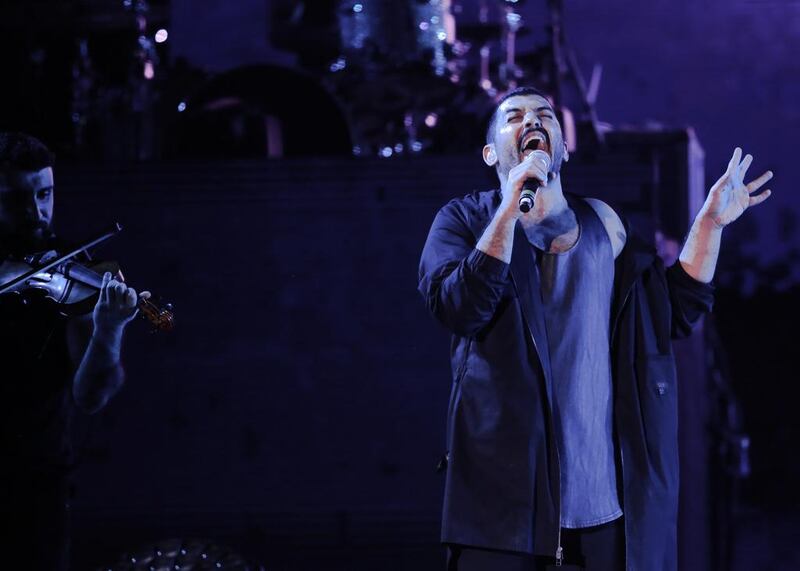Dubai Media City Amphitheatre has played host to some of the biggest names in western rock and pop – from Eric Clapton to JLo – but the grassy concert space has never seen anything like this weekend’s Wasla music festival.
The event presented an extraordinary, unparalleled array of Arab alternative artists – the line-up’s diverse sonic swoop only echoed in the geographic sweep of its origins.
It ran for 12 hours, from Friday afternoon until the early hours of yesterday morning. The lion’s share of fans were there to see Mashrou’ Leila, arguably the biggest and most-original Arab indie act of this, or any, generation.
Four albums into their career, the Lebanese quintet have achieved that rare feat of creating a unique sound and aesthetic – a potent broth of indie, electro, folk and tradition that genuinely sounds like no one else.
On stage, the band are as visually arresting as their music. Magnetic frontman Hamed Sinno swings from artful poise to reckless abandon.
Drums and bass sit atop three-metre platforms at the rear of the stage, the surfaces adorned with LEDs projecting the band’s arty videos – the effect is a band playing inside their own iconography.
While this kind of big-budget spectacle – and mainstream success – means it is a myth to hail Mashrou’ Leila as “underground”, the band still offer a voice to, and for, a generation of discontent. And they do it with such force and flair, it is impossible to ignore.
They were preceded by Jadal, a band as musically generic as Mashrou’ Leila are inventive. But formed more than a decade ago, these Jordanian rockers should be acknowledged as influential forebears of the region’s recent wave of guitar bands.
Frontman Mahmoud Radaideh is not a happy man. Over plodding grunge and metal-lite riffing, the singer-guitarist snarls lyrics in a husky tone – angry music somehow eliciting euphoric audience singalongs. A warmer counterbalance is found in second vocalist Ahmad Zou’bi, who channels an imploring, Levantine vocal style into these otherwise straight-western rock workouts. These two swaggering, crowd-pleasing all-male bands were bookended by performances from distinctive, original and unrivalled female solo artists.
Taking to the stage at dusk was Souad Massi, a veritable legend of alt-Arabia, who inspired many of those performing at Wasla – we spotted Jadal posing for selfies with her backstage.
Since fleeing death threats in her native Algeria – so the story goes – Massi has enjoyed almost two decades as a Paris-based “world music” icon.
Her sound has evolved in fascinating directions – largely acoustic guitar-driven songs, peppered with Bedouin beats and flamenco flourishes, and snaking, oud-like guitar lines.
With just a hint of road-worn spectacle, a percussive face-off led into the rousing big rock optimism of El Houriya (Freedom). Raoui – the title track from 2001's breakthrough album – pulled hardest at the heartstrings.
The most-engaging performance of the night was the UAE debut of Emel Mathlouthi, who has succeeded in crafting a singular voice in an increasingly cross-pollinated musical climate.
The Tunisian is blessed with a phenomenal voice, but it is how she employs it that so viscerally shocks the system.
Joined on stage by two percussionists and a pianist/laptop geek, Mathlouthi hypnotically intones guttural moans and piercing shrieks over a restless canvas of beats, beeps and blurs. Her spiralling voice – electronically looped, splintered, distorted – becomes an invocation.
Singing in a mix of Arabic and English, her message is that of the outsider, her voice the sound of a human tear.
Thrown into the spotlight in the aftermath of the Arab Spring, and branded a “protest singer”, Mathlouthi was never likely to stay silent in Dubai.
She made pleas for Syria and workers alike. She told how, outside the show, a security guard told her “some people run to lose fat – and some to get food”, prompting an impassioned denouncement of a world where the underclasses “give up their life and health to help the rich get richer and feed this humanity of greed”.
With her second album due for release on February 24, the show caught Mathlouthi at a pivotal juncture, between the sounds of her acclaimed 2012 debut, Kelmti Horra, and a braver, unfamiliar work to come.
After this cathartic cataclysm, only a few stragglers stuck around to hear Egyptian producer Neobyrd’s brand of classically influenced electronica.
After all, the doors had opened some 12 hours earlier, when the UAE was most groovily represented by Abri & Funk Radius. While best known for covers gigs, this platform offered the band a chance to unveil a solid set of neo-soul originals, most being performed for only the second time following their debut at Sole DXB last year. Word is an album will follow later this year.
This dynamic live musical arc was punctuated by boisterous MCs, who repeatedly welcomed us to “the first edition of Wasla”. We have every reasonable hope for another one soon.
rgarratt@thenational.ae





